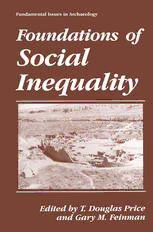Table Of ContentFoundations of
Social Inequality
FUNDAMENTAL ISSUES IN ARCHAEOLOGY
Series Editors: Gary M. Feinman and T. Douglas Price
Department ofA nthropology
University of Wisconsin-Madison
Editorial Board: Ofec Bar-Yosef, Harvard University. Christine Hastorf,
University of California-Berkeley. Jeffrey Hantman,
University of Virginia. Patty Jo Watson, Washington
University. Unda Manzanllla, Unlversldad Naclonal
Autonoma de Mexico. John Parkington, University of
Capetown. Klavs Randsborg, University of Copenhagen.
Olga Soffer, University of Rllnols • Matthew Spriggs,
Australian National University. John Yellen, National
Science Foundation
FOUNDAnONSOFSO~INEQUAUTY
Edited by T. Douglas Price and Gary M. Feinman
A Continuation Order Plan is available for this series. A continuation order will bring delivery
of each new volume Immediately upon publication. Volumes are billed only upon actual
shipment. For further information please contact the publisher.
Foundations of
Social Inequality
Edited by
T. DOUGLAS PRICE
AND
GARY M. FEINMAN
University of Wisconsin-Madison
Madison, Wisconsin
Springer Science+B"siness Media, LLC
Library of Congress Cataloging-in-Publication Data
On file
ISBN 978-1-4899-1291-6 ISBN 978-1-4899-1289-3 (eBook)
DOI 10.1007/978-1-4899-1289-3
© 1995 Springer Science+Business Media New York
Originally published by Plenum Press, New York in 1995
Softcover reprint of the hardcover 1st edition 1995
10 98765432
All rights reserved
No part of this book may be reproduced, stored in a retrieval system, or transmitted
in any form or by any means, electronic, mechanical, photocopying, microfilming,
recording, or otherwise, without written permission from the Publisher
To Leslie}. Price, Theron D. Price,
Ester Buchholz, and Stephen E. Feinman,
for the many years of love, support, and care
Contributors
Kenneth M Ames • Department of Anthropology, Portland State University,
Portland, Oregon 97207
Jeanne E. Arnold • Department of Anthropology and Institute of Archaeol
ogy, University of California, Los Angeles, California 90024-1510
Richard E. Blanton • Department of Sociology and Anthropology, Purdue
University, West Lafayette, Indiana 47907
Robert D. Drennan • Department of Anthropology, University of Pittsburgh,
Pittsburgh, Pennsylvania 15260
Gary M. Feinman • Department of Anthropology, University of Wisconsin
Madison, Madison, WISCOnsin 53706-1393
Antonio Gilman • Department of Anthropology, California State University,
Northridge, California 91330-8244
Brian Hayden • Department of Archaeology, Simon Fraser University, Bur
naby, British Columbia, Canada V5A IS6
Stephen Plog • Department of Anthropology, University of Virginia, Char
lottesville, Virginia 22903
CONTRIBUTORS
T. Douglas Price • Department of Anthropology, University of Wisconsin
Madison, Madison, Wisconsin 53706-1393
Dale W Quattrin • Department of Anthropology, University of Pittsburgh,
Pittsburgh, Pennsylvania 15260
Preface to the Series
The concept for this publication series on critical issues in archaeological
thought and research originates in a growing awareness and concern that
archaeology must actively pursue the development of theories of human
society. Our discipline has for years begged and borrowed from many fields
a variety of useful and appropriate ideas and theories concerning the social,
political, economic, and ideological aspects of human society. Much of the
theory for our archaeological perspectives has come directly from social and
cultural anthropology and its foundation in ethnography. The description of
the enormous variety of human society from all parts of the world and com
parison of commonalities and contrasts in the first three-quarters of this
century fostered an explosion of questions and answers in ethnology about
the variability and nature of human society. However, the age of discovery and
exploration of the surface of the earth is coming to an end. To a large degree,
cultural anthropology is turning to other areas of human behavior. Ethnog
raphy, especially among nonindustrialized peoples, is much less a focus than
in previous decades.
On the other hand, archaeological information is growing rapidly, and
our questions need to be informed by a larger body of theory on the operation
of past and present human societies. As illustrated in this volume, all sources
for ideas are legitimate. Theory can be woven together and constructed from
diverse domains in the social and historical sciences as well as generated
directly by archaeologists. In fact, archaeology is becoming a wellspring of
thinking on change in human society. It draws on reexaminations of ethno
graphic accounts, documentary histories, architectural analysis, information
theory, ecology, and the comparative analysis of archaeological materials. We
see this comparative and global investigation of human diversity to represent
one logical outgrowth from the traditional foundation and aims of holistic
Ix
x PREFACE TO THE SBlUBS
anthropology as defined by Franz Boas and others at the beginning of this
century.
Fundamental Issues in Archaeology, then, is a new series of publications
focusing on current, critical issues of broad relevance in anthropological
archaeology. The thrust of the volumes will be topical and comparative, rather
than areal or methodological; we will concentrate on issues, rather than
techniques or regional syntheses. We will consider both monographs and
edited volumes that are concerned with basic questions of research and
theory. The series will publish both fully authored monographs and integrated
edited works that fit its theme and goals. We welcome manuscripts and
suggestions for the evolution of Fundamental Issues.
GARY M. FEINMAN
T. DoUGLAS PRICE

